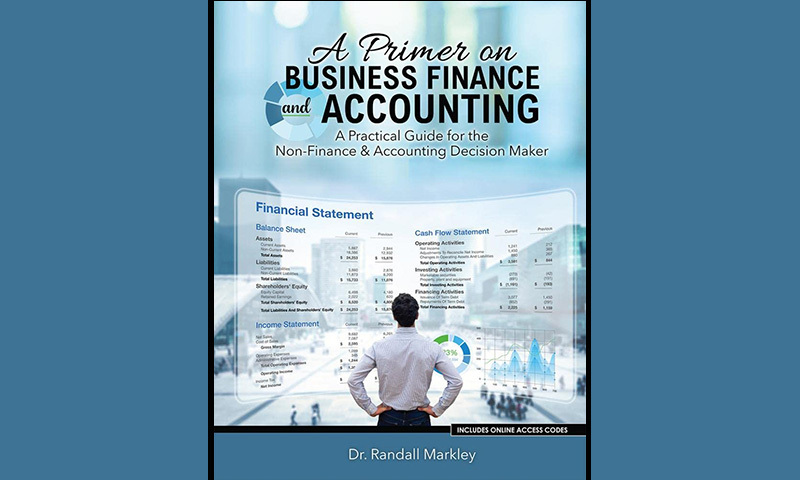Accounting is challenging, yet — as Warren Buffett says — it’s the language of business. You can’t do business without doing accounting.
But students and business leaders alike find learning finance and accounting to be difficult and discover that they can’t always use what they have learned after completing a course.
Why? It is often because textbooks are difficult to read. Students may dread taking finance and accounting courses and express frustration when they do not learn what they need or expect.
Randy Markley’s new book, , is designed to bridge that gap. Dr. Markley — Crowell Associate Professor of Accounting and Finance — talked about the genesis and methodology of his book.
So what made you want to write this?
It's been coming for a while. I’ve been using the finance and accounting textbooks that are out there now, and some are pretty good, but here's the problem: the students hate them.
My students tell me, “professor, I hate this book, but in the classroom, you make it make sense.” So I thought, this is making it unnecessarily complicated for them, but it’s making more work for me, too!
I knew there had to be a way I could unpack this material so they could actually use it. And then my wife — who worked in industry for 20 years — mentioned that oftentimes her bosses would come to her and ask, do you know how to do a budget? Can you read these financials? Can you help me with this?
So her idea was that, if I was writing a hands-on basic textbook, I really needed to expand the audience beyond just students. It needs to be like a desk reference, something for a novice who has a question or a need and does not have time to go out and take an accounting course. Basic things, like how to read and analyze a financial statement, an income statement, a balance sheet or a cashflow statement, how to do a budget, and so on.
That’s why this book is different — it’s for students but also for everyone out there that’s in a financial decision-making role.
How did you decide to structure it?
I needed to write it the way I teach it. In class, I try to clarify the concepts by asking questions and using real-world examples. So it’s not paragraph after paragraph of explaining and defining — it’s more lab/lecture, where we introduce the problem or the issue and then we introduce the concepts as we’re working through it. That's the way I teach, and so that’s the way I wanted to write it. But I still wasn't sure exactly how to translate that method into a book, so I asked God to help me.
Right away a word came to my mind, catechesis. Maybe you’ve heard of a catechism — learning by a series of questions and answers. So I looked at Martin Luther's small catechism, which is a great primer on the Christian faith.
So I set out to write about accounting the same way — questions and answers. Each chapter begins with a central idea, then it's questions and answers. For example, in the first chapter, Understanding Financial Statements, there’s an initial question: What are financial statements? It gives a simple, initial definition, then there’s another question: what are the main needs that financial statements answer? Then, who uses these statements?
The questions start at the 30,000 foot level, and then go deeper and deeper and become more complex. So by the time you get to the end of the book, you've unpacked many things — you've taken that onion and peeled it all the way back.
It's still a primer book, which means you could pick up the book — having never taken any course before — and actually walk away with some pretty good skills. So that's what the book does for both students and professionals in the workplace.
I have two other books underway already. The next one is going to get more in depth to some of the tools that a manager could use. The third one will be something like Mastering Finance and Accounting. So you start with a primer, then essentials, then mastery.
In a general-audience book like this, you can't be explicit about your faith, but is there a way it comes through implicitly?
Within the content itself, I'm just keeping it about finance. But the format itself a lot of people will recognize — hey, that's based on a catechism.
One thing that is in there — and I say this to my students in class too — is that when you get into the work world, you're going to find that you may have more skills than your coworkers and sometimes more skills than your boss. How do you handle that as a Christian? It’s important to demonstrate humility. You can’t look at your boss and think, what an idiot. I should have their job!
The skills and understanding that you have are yours to use in serving your neighbor, serving your boss, serving your coworkers, and just being helpful. Work as unto the Lord, you know?
I really do want our students to seek excellence — not so you can get the big paycheck or the big office or the big whatever, although God may give you those things. But be excellent because Jesus is excellent — not proud, but humble and helpful and excellent.
There is an increased emphasis at Crowell on providing wisdom not just to undergrad and grad students, but to the business community in general, and this book seems to be part of that.
Absolutely. There are many business people who’ve never taken an accounting or finance course. This book is also for them, something they’ll use to get started making good decisions right away.
My view of business is to serve. That's ministry right there. Not to do harm, but to do good — good to my customers, good to those above me on the flow chart, those below me, my peers. They’re all my neighbors and I want to serve them.
In terms of accounting and finance, what’s the best way to serve? By making wise financial decisions. This book helps you learn how to do that.
Find .
 51ÂÜŔň
51ÂÜŔň

.jpg)
.jpg)

.jpg)